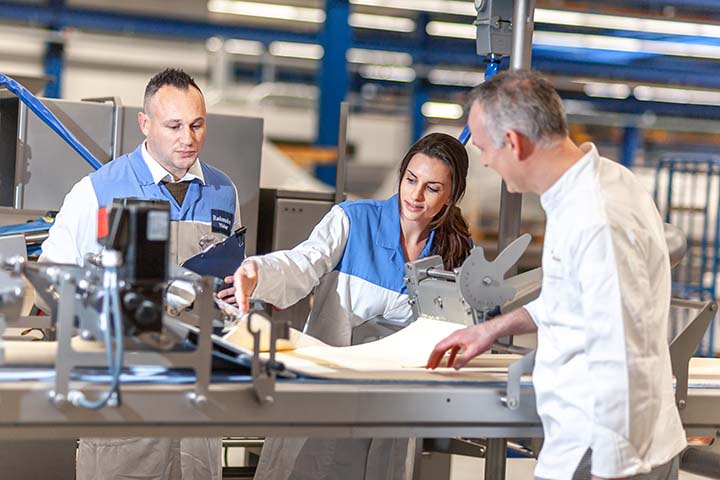
Rademaker aims to build on and share the knowledge it has acquired through the years, and its Technology Center is proof of that. Since 2015, sharing knowledge has been expanded with the Rademaker Academy, built around teaching the fine points of production technology and maintenance.
The Rademaker Technology Center (RTC) features several pilot lines, full-scale, certified production lines that meet the latest standards, which are available for testing. The company believes knowledge is an investment worth making, and invest it did: over the past two years, the RTC has been developed to more than twice its starting size, to its current 2,400sqm. In addition to the pilot lines that can run any type of bakery products, its equipment lineup also grew to add kneaders, proofers, ovens and freezers – to replicate all production steps.
Wiep Bergsma, the head of the RTC, estimates the workload carried out at the Center: “We run tests at the RTC with our production lines for around 60 to 70 customers each year. Some of them visit us for a day, others stay for five days. The number of tests varies enormously, but averages at two or three tests per customer. Besides that, we also demonstrate our machines and processes for prospects and run tests for research and development. Ultimately we do around 350/400 tests each year. So, that’s quite a lot.” It’s not just about training either: RTC specialists have been working together with the R&D teams more and more recently, for new developments around market demands and requests from customers. The technologists report issues they encounter, for example, and resolve them with the R&D specialists. New tools are then developed for the specific situation, which are tested at the RTC. “In terms of sustainability, we mainly focus on the more targeted use of raw materials, which is all about wasting less. In addition, our customers want to achieve optimal efficiency and create minimum failure. Weight accuracy naturally plays an important role too,” adds Bergsma.
How to test and develop
Rademaker works together with the Dutch BoulangerieTeam at the RTC to come up with new and improved products and processes. It is a team of highly professional artisan bakers, winners of the international bakery contest ‘Bakers in the city’ 2020 in Italy.
The Dutch BoulangerieTeam and the specialist from the RTC recently sought out to make the best possible version of a ham-cheese product, for example. Preliminary research by Rademaker showed that the croissant would actually be the worst shape to do justice to the flavors of ham and cheese. To change the product, they first looked at the properties of the fillings: ham contains a lot of moisture which rises in a product, and cheese contains a lot of fat, and that sinks. “In a croissant, therefore, the water vapor goes up, creating a large air bubble above the ham and cheese. The fat sinks to the bottom of the product, which makes that part difficult to bake, if at all. Also, the ham and cheese must be encapsulated in a regulated way, because if you put those ingredients on top of the dough, they dry out and you lose the flavor,” Bergsma illustrates. We worked with those issues and developed a snack. The working team discovered that the best flavor comes from using ham and cheese blocks measuring 1x1cm and 5mm thick. The carrier they chose was ragout, to bring out more flavor from the cheese. “This way of filling is perfect for a snack/swirl. The cheese bakes towards the top and the fat sinks slightly so that it gets a deep-fried bite. The resulting products were ultimately rated 9+. This is a perfect example of what we already do and want to do more at Rademaker: working with the Dutch BoulangerieTeam to improve and change products. In this way, we are all challenged even more to come up with new and better products and processes,” underlines the head of the training facility, noting that they can adapt the technology to the properties of the product.
Some of the trends with clear interest going forward include vegan products and bite small bite-sized premium goods. Handmade is another claim we can expect to see more of, and which is on the research list at the RTC: “By partly adding manual work to create authenticity, companies can claim that a product or process is handmade. This can be done, for example, by adding traditional processes to the production process, such as a wood-fired oven, to give products a unique character. I think that this will be a growth area in the long term,” the specialist anticipates. Rademaker provides input related to not just developing products, but also entire concepts.
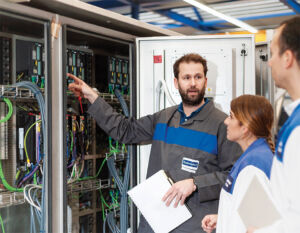
Investment in training
Since its opening in 2015, the Rademaker Academy in Culemborg has set out to maintain and share the company’s time-earned knowledge.
Engineers and operators who want to learn about production lines come for training at the Rademaker Academy. The teaching and training location is complete with a teaching room, a practice room with a fully operational two-section laminator and universal line, and a virtual reality lab (VR lab). On-site training is also an option using a mobile VR setup. Rademaker offers basic and advanced training in both operating as well as maintaining company machines. The basic training begins with a broad explanation of the machine and focuses on building on the basic knowledge of dough technology and production technology required for optimal operation of the machinery. The advanced training focuses on more specific and in-depth content. On a technical level, the training could address fat pump or dosing machine maintenance and in a technological area, training can relate to specific actions in the production process.
Kasper Rozeboom, Aad den Braven and Jan Willem Jansen are the educators at the Academy. Rozeboom says about their work: “With the new, well-equipped location in Culemborg, we have taken a huge step in offering an even better service to our customers. When knowledge is passed on by people who understand the practice, this offers true added value.” Den Braven adds: “I sometimes compare it with obtaining a driving license. You can only drive a car as it should be driven if you have a driving license. It’s the same with our machinery. The users obtain their ‘driving license’ at the Rademaker Academy, which ensures that they can operate the machinery optimally in their own environment.”
The Academy has a designated space for training purposes. The course participants come to Culemborg, where they can focus entirely on safe, hands-on training. “First production steps in this training line match the large production lines that participants use in their workplaces. The big difference is that it’s OK to make mistakes. After all, that’s how you learn. Moreover, the small group size means that everyone has attention. As trainers, we adapt the training to the group’s needs,” Jansen explains.
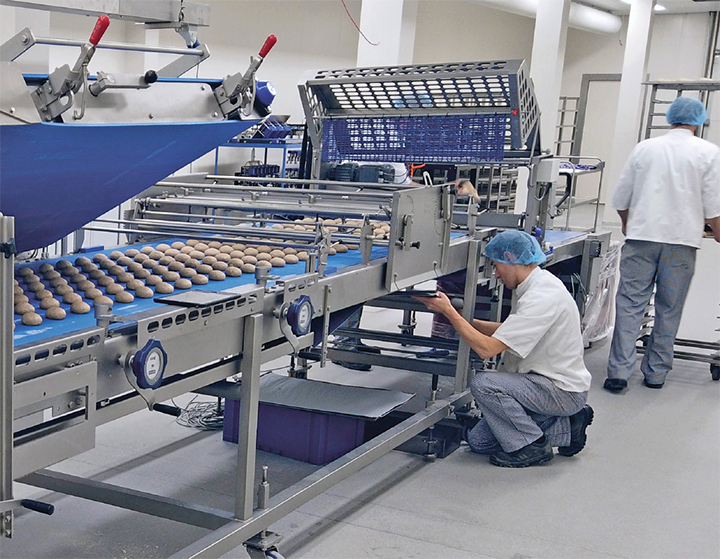
RTC technological support
The development process starts in the Rademaker Technology Center (RTC), featuring several production lines for all types of bakery products, whether bread, donuts, puff pastries, croissants, pizzas and flatbread, gluten-free or specials.
During 2019/2020, the RTC was renovated and expanded. In terms of surface, it has more than doubled to 2,400sqm. The production capacity in the RTC is identical to actual production conditions. To closely simulate the manufacturing process, it is also equipped with kneaders, proofers, ovens and freezers from renowned suppliers.
The RTC team consists of over 15 technologists.
Services: demonstrations and tests, recipe and product development, sample production.
The VR lab
Rademaker has been offering part of the operator training with the help of virtual reality for the past year. Rozeboom finds VR provides “A fantastic way to practice operating a production line reliably, without waste or financial consequences. Initially, it takes a while for people to get used to walking around with a VR headset. Once they’re used to it, the participants are all very enthusiastic. We’ll certainly be developing this further.”
The teaching location in Culemborg and the on-site training, with or without virtual reality, provide a foundation for growth at the Rademaker Academy. New production lines are arriving and existing lines continue to be developed all the time – this means new training is needed. “The operation screens used in the lessons must always match the screens that customers use in their production lines. VR will replace some of the theory and practice, and the online training that we developed in connection with COVID-19 is also here to stay. We see these different types of training as a fantastic addition to our range,” Rozeboom estimates.
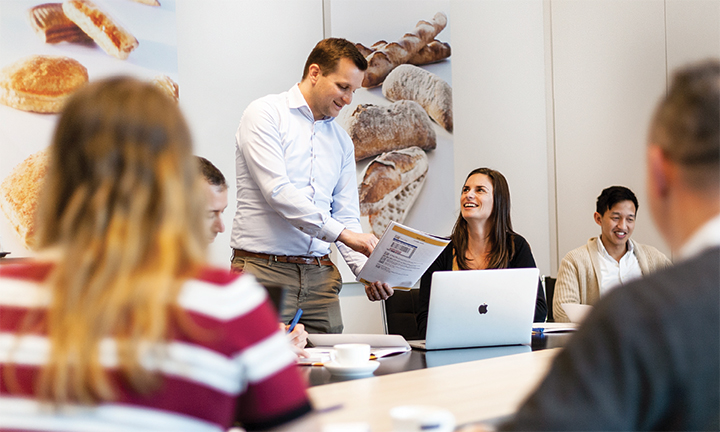
Training on offer
A team of technological and technical trainers developed two training themes focusing on the efficient operation of the Rademaker production lines. The training themes, operating and maintenance, both have a basis and advanced training module. Training is given in English, Dutch or German.
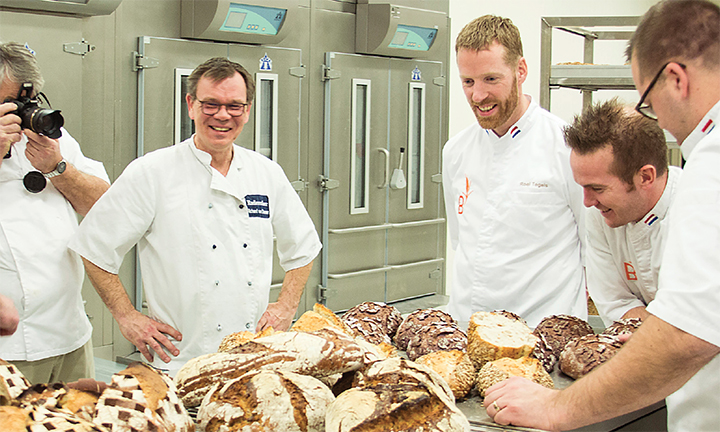
Operating
1 Basic operator training.
For operators, managers and line managers. The theoretical training will consist of unit descriptions, cascade, synchronization, virtual reality training and touch panel explanation. The practical training will consist of running training doughs on the line, troubleshooting and cleaning training.
2 Advanced operator training.
For product developers, managers, technologists and line managers. Customer-specific training content that focuses on specific units, ingredient information and product and process knowledge. Teams can resolve production line problems after this training.
Maintenance
1 Basic maintenance training.
For maintenance engineers and managers. The theoretical training contains of unit descriptions, cascade, synchronization, virtual reality training and touch panel explanation. The practical training contains belt tracking, greasing, troubleshooting and cleaning training.
2 Advanced maintenance training.
For maintenance engineers and managers. This customized training focuses on specific units, electrical systems, the process and advanced mechanical knowledge. After this training, teams can resolve the bigger problems and maintain the production line correctly.


